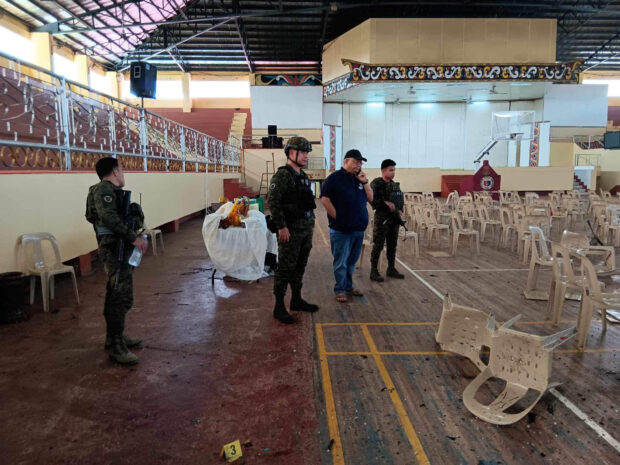Marawi blast won’t break Muslim-Christian solidarity – bishop

Lanao Del Sur Governor Mamintal Adiong Jr. looks on as law enforcement officers investigate the scene of an explosion that occurred during a Catholic Mass in a gymnasium at Mindanao State University in Marawi, Philippines, December 3, 2023. Lanao Del Sur Provincial Government/Handout via REUTERS
ILIGAN CITY—As night falls, a steady stream of people begins to gather at the Capin Funeral Homes here where the remains of Evangeline Aromin, 31, lie in state.
Among the mourners are Muslims, mostly Maranaos who are Aromin’s friends, classmates, or students at the Mindanao State University (MSU) College of Sports, Physical Education and Recreation, where she was a faculty, following in the footsteps of her parents who were originally from Bansalan, Davao del Sur.
“Evangeline practically grew up in the MSU community. Her parents were wed by Fr. Michel (de Gigord) and she was baptized by Fr. Chito (Soganub),” Cora Mangelen, an economics faculty and among the lay pillars of Muslim-Christian dialogue in Marawi City, told the Inquirer.
On Monday, while Iligan Bishop Jose Rapadas celebrated a Holy Mass at the wake, the Maranao mourners also intently followed the rites, especially listening to his short homily when he prayed for justice to all victims of Sunday’s bombing at MSU that killed four Christian worshippers, including Aromin, and wounded at least 50 others.
Heartwarming
Marawi Bishop Edwin dela Peña said the sympathy and solidarity shown by Muslims in Lanao del Sur and other parts of the country was heartwarming.
Article continues after this advertisementHe noted that the first responders who brought the injured to hospitals were mostly Muslims.
Article continues after this advertisementAmid the sudden increase of patients at Amai Pakpak Medical Center in Marawi City, its director, Dr. Shalimar Sani-Rakiin, also a Muslim, immediately called all staff members to report for duty.
Maranaos also stood as watchers to injured students who did not have family members to accompany them at the hospital.
The three other fatalities were Riza Daniel, 49, of Tangub City, Misamis Occidental; Janine Arenas, 18, of Balabagan, Lanao del Norte; and Junrey Barbante of Maribojoc, Bohol.
An immediate aftermath of Sunday’s bombing was the exodus of students from the campus who were pressured by their families to return home as security jitters increased.
The boarding houses and dormitories of those who were not able to leave were guarded by Maranaos. A food brigade was also organized to help them out with their meals.
“These gestures give us hope and tell us that this brutal and senseless violence will not have the last word. It will not succeed in demolishing the good works built over many years,” Dela Peña told Agenzia Fides, the information service of the Pontifical Mission Societies. INQ